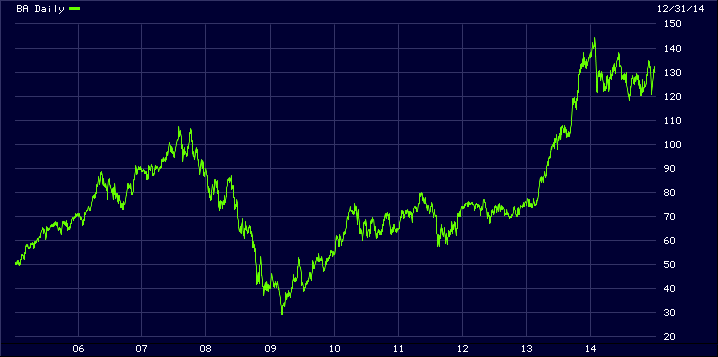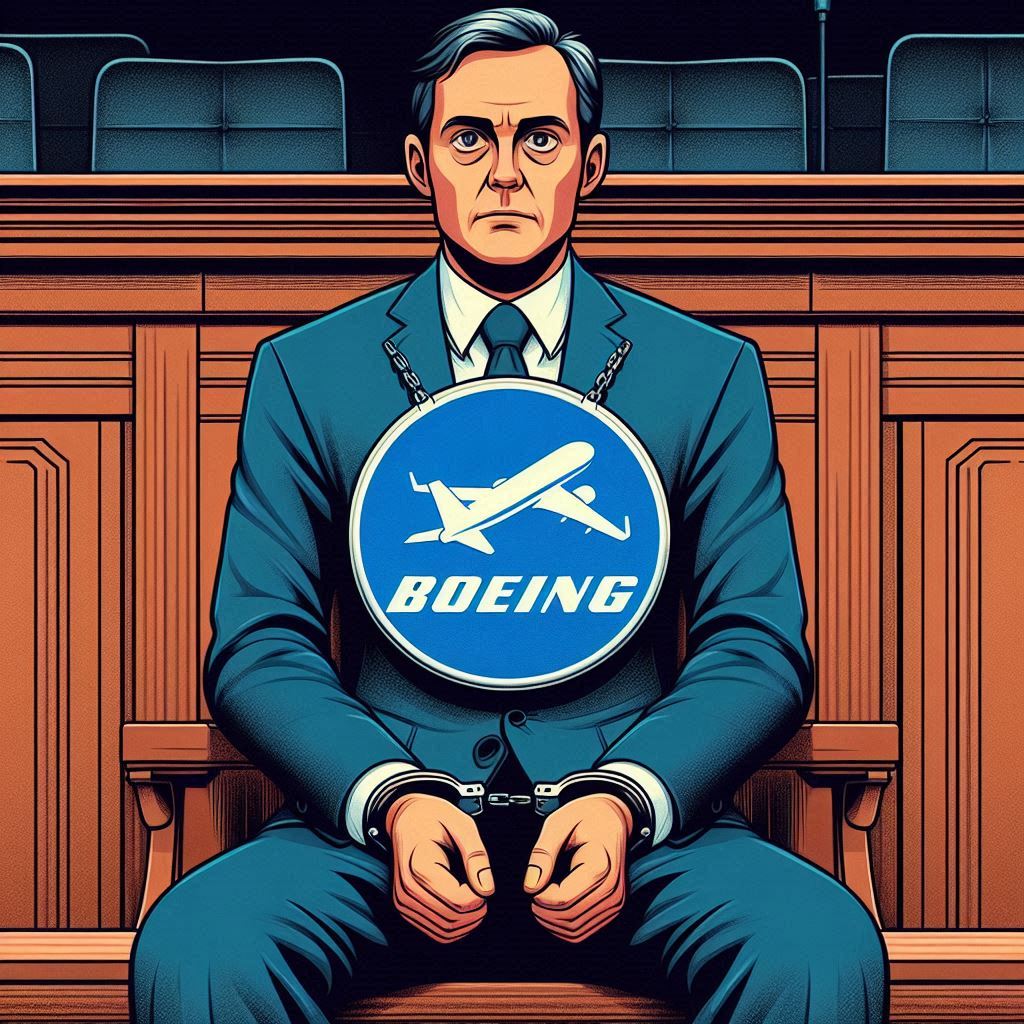The Main Squawk: Boeing buys Spirit (Aerosystems)
Boeing reached an agreement to get back together with Spirit Aerosystems. After nearly twenty years of separation, two 737 MAX crashes, and one door flying off the hinges, the two companies are now joined again at the hip.
But why the separation in the first place?
Back when greed was good, Boeing spun off the supplier in an attempt to shed costs. This happened in 2005 when subprime mortgages were a thing, Alan Greenspan was still in charge of the Fed, and investors were trying to squeeze every penny out of everything they owned. And it worked.

Courtesy: BigCharts.com
Boeing stock rose steadily in the years following its cost-cutting habits, doubling from $50 per share at the start of 2005 to over $100 per share at the onset of the 2007-2008 financial crisis.
Meanwhile over at Spirit Aerosystems, its new-founded management decided that having only one customer (Boeing) wasn’t a great idea. So they did what any other independent contractor would do: they started branching out. And when the dust started to settle in the wake of The Great Recession, they actually started turning a decent profit. Among the aircraft manufacturers they would wind up making parts for, however, was Airbus.
This meant trouble for Boeing when it stated its intention to buy back the parts manufacturer, with regulators (and Airbus) citing an obvious conflict of interest. Fortunately, the lawyers hired to consult on the merger had an idea: to sell the Airbus parts division to Airbus for $1.
“We believe this deal is in the best interest of the flying public, our airline customers, the employees of Spirit and Boeing, our shareholders and the country more broadly.”
Boeing Co. President and CEO Dave Calhoun
The $1 payment that Boeing received from Airbus was framed and put on a $50 plaque in Chicago, yielding a $49 loss on the transaction.
Boeing plead guilty in a deal with the Department of Justice to a felony charge for conspiring to defraud federal investigators over the two fatal 737 MAX crashes. It will pay a $487.2 million fine and face a requirement to spend another $455 million to “improve compliance and safety programs.”
The Company will spend three years on probation where an “independent compliance monitor” will have unlimited access to its facilities to ensure it adheres to agreed upon safety measures. The independent monitor has been given self-defense training in the event Boeing’s hitman makes a pass at him.
This is the second agreement that the Chicago-based planemaker is entering with the DOJ after violating its first one. All bets are on the table to see when it breaks its promise under the new agreement.
Spirit is furloughing fifty pilots as it continues to struggle with changing customer desires, engine issues on its A320neo fleet, and a C-suite that is growing more expensive. Executives in Miramar, F.L., thought nothing of sending WARN notices to another 200 pilots while awarding themselves salary increases and bonuses ranging from $500,000 to $1 million.
I’ve shared my thoughts on why people are flying the ultra-low cost carriers (ULCCs) less and less, but to recap:
- Major airlines (American, Delta, United, and even JetBlue) all have a product that competes with the ultra-low fares advertised by companies like Spirit (e.g. Basic Economy)
- All of the Major airlines have solid loyalty programs which can take people further than Spirit’s “Free Spirit” frequent flier program when they want to cash in their miles
- Customers are proving a willingness to pay more for the flight that most closely fits their schedule, or to pay more for extra legroom, or both
In its attempt to conform to new passenger behavior, Spirit is eliminating change fees, cancellation fees, and is raising restrictions on bag weight from 40 lbs. to the industry standard of 50 lbs. And while those changes are welcome, the elimination of those fees is going to be anything but a small dent in Spirit’s pocketbook. Collectively, the fees generated $150 million in revenue for the Company in 2023.
The Company is down $142.6 million so far this year, which comes on the heels of a $103.9 million loss in 2023, with a stock price that is down 77% year-to-date. (Yet, for some reason, Elliott still feels like Southwest is the better buy.)
The fight for new slots at DCA is intensifying. When the FAA Reauthorization Act became law earlier this year, Senators selfishly opened up slots at DCA—Washington’s favorite airport—and Spirit thought it could apply for them. But late-last week, the Department of Transportation declared them ineligible without inviting them to plead their case.
The back story is that Spirit won four slots in an FAA lottery twenty-one years ago. It sold those slots to Southwest in 2012, but technically the rules say that if an airline had won slots in an FAA lottery in the past fifteen years, they shall be deemed ineligible to participate in future lotteries. Spirit struggled to make money off the slots in the mid-2000s back when it flew MD-80s (and even a few DC-9s), which is why it sold the slots to the LUV-able Texas-carrier in the first place, so I get why the Company is aggravated.
Their argument is that since they’ve been out of the market for 12+ years, the DOT has an obligation to at least let them enter the auction and pony up what little cash they have in an attempt to take ownership of even just one of those new slots. Spirit has the right to appeal the decision, and they will, creating yet another Battle Royale legal fight for the carrier. This will be the carrier’s sixth fight in court over the past two years, putting it firmly in the lead as the Attorney’s Airline of Choice.
Southwest prescribed itself a poison pill to fend off activist investor Elliott. The strategy, officially dubbed a “shareholders’ rights plan,” will issue additional shares to existing shareholders if Elliott’s stake reaches a certain percentage. This action would lower the stock price, possibly making the airline less attractive to a potential buyer.
The problem with this strategy is twofold. First, when a company floods the market with more shares, the value of the shares decreases. This could make existing shareholders lose interest in holding them. If these shareholders decide to sell off their stakes, and an activist investor stays the course, the investor could buy those shares at a very low price and easily take control.
On the flip side, if an activist investor decides that the share value is damaging its portfolio, it could sell off its stake. Elliott already has $2 billon in Southwest and has plans to increase its stake. A sale of that magnitude could drive the Company’s share price even lower, already weakened by the poison pill.
Southwest management has a right to defend itself, but this is a classic case of a company washing down a bad decision with a complimentary glass of corporate courage.
Southwest cut its revenue expectations for Q2 earlier last week, forecasting a drop as low as 4.5% for the three months ending June 30.
The company previously expected a drop of 1.5 to 3.5%, but for those non-math majors out there, this is worse. The airline said its “revised projection is primarily from complexities in adapting its revenue management to current booking patterns in this dynamic environment,” which is a very fancy way of saying it’s been dealing with a (repeated) kick in the nuts. The airline will release its full Q2 earnings on July 25, and it’s sure to be a doozy.
As far as revenue was concerned, the Company said it was expecting an all-time record for operating revenue, which is actually pretty crazy when you think about it. Strictly by the numbers, when Southwest gets its costs under control, its profit margins stand a chance at being considerably larger by the end of the decade. (Which is only more trouble for Spirit, if they’re even around in a few years.)
Projections for the rest of the year include increases in capacity for Q3, with a slight reduction in capacity for Q4. Full year-over-year capacity is expected be up about 4%.
Air France-KLM isn’t expected to medal at the Olympics.
American is pressing the pause button on New Hire classes until 2025.
Delta finally opened its newly-renovated SkyClub at JFK.
United is ramping up its pilot hiring, making good on a promise it made earlier this year.
WestJet mechanics are headed back to the line after 48-hour “a work stoppage” (aka. “a strike”) resulted in a tentative agreement.

Leave a Reply